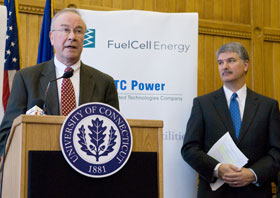  |
| HOME | THIS ISSUE | CALENDAR | GRANTS | BACK ISSUES | < BACK | NEXT > |
Alternative energy research receives state, industry fundingby Michael Kirk - September 24, 2007 |
||||
| Three leading state energy companies have contributed a total of more than $2 million for a new alternative energy research initiative to be based at UConn. The funding was announced by UConn officials and state Senate President Pro Tempore Donald E. Williams at a press conference at the state capitol on Sept. 18. Securing these funds also triggered the release of a further $2 million pledged by the state for the University’s eminent faculty program, a public-private partnership backed by the legislature. The combined state funding and industry match will allow the School of Engineering to recruit world-class researchers and additional faculty members who have expertise in the area of fuel cells and other forms of sustainable energy. The School will use the funding not only to pioneer new energy technologies, but also to create a training ground for those who will be part of the energy workforce and entrepreneurs, fostering innovative spin-off opportunities. The donating companies are FuelCell Energy of Danbury, the Northeast Utilities Foundation, and UTC Power of South Windsor. “Connecticut has a rare opportunity to provide national leadership in the development of viable, sustainable, and environmentally sound energy alternatives, including fuel cells and biofuels,” said University President Michael J. Hogan. “We will do this as part of a focused partnership between the University, the state, and industry.” The initiative began with the passage of a bill, “An Act Concerning Jobs for the 21st Century,” by the state General Assembly in 2006. A provision of the bill charged the University’s Board of Trustees with developing a program to attract world-renowned faculty members to the University in a research area deemed strategically important. University Provost Peter J. Nicholls invited competitive proposals from across campus and awarded the first eminent faculty position to the School of Engineering to address the critical area of sustainable energy. Late last year, the General Assembly established a permanent line item of $2 million annually to support the eminent faculty initiative at UConn, contingent upon the University securing an equivalent amount from industry. “This collaboration between the state legislature and the University of Connecticut represents the best we have to offer: a commitment to creating and maintaining our competitive advantage in cutting-edge technologies, and a huge investment in the research and development of energy-efficient fuel cells, of which Connecticut is a global leader,” said Williams.
He noted that 15 percent of fuel cell employees around the world are located in the state. The initiative is expected to help Connecticut meet Gov. M. Jodi Rell’s goal to reduce fossil fuel consumption by 20 percent and replace it with clean or renewable energy sources by 2020. Raymond Necci, president and chief operating officer of The Connecticut Light & Power Co. (CL&P) and Yankee Gas, said, “When we received the proposal from the School of Engineering, we immediately knew it fit perfectly with Northeast Utilities Foundation’s three strategic areas for investment – economic development, workforce development, and environmental stewardship. “By enabling the field’s brightest minds to teach at UConn, we hope to attract a class of promising young engineers,” he said. UConn’s School of Engineering has a number of energy-focused units, including the Connecticut Global Fuel Cell Center and the Biofuels Consortium, whose scope of research and development activities will complement the broader mission of the sustainable energy initiative. Both entities work closely with Connecticut’s energy industry. “We are indebted to our partners for their vision and sense of purpose,” said Provost Nicholls. “These organizations are pushing energy innovation in new directions. With their support, the eminent faculty initiative in sustainable energy at UConn will propel Connecticut and the University to the forefront of sustainable energy development and industry, while fostering a visionary green energy economy.” Erling Smith, interim dean of engineering, said the School will launch a national search for a scholar of international stature who will effectively leverage and expand the University’s research and development activities in sustainable energies, including fuel cells, biofuels, and photovoltaics. The School expects to hire several additional senior faculty members and support staff to complement ongoing activities in the area of alternative energy. Nan Cooper contributed to this article. |
| ADVANCE HOME UCONN HOME |

